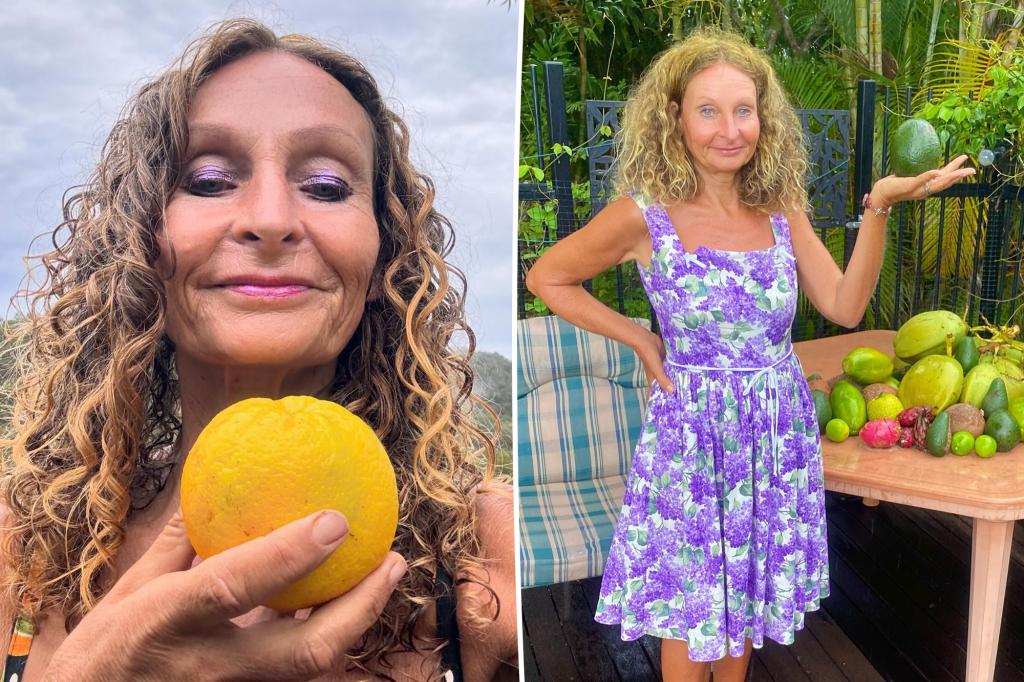Anne Osbourne’s 33-year journey as a fruitarian, consuming solely fruit for sustenance, defies conventional dietary norms. Her unwavering commitment to this unique lifestyle, sparked by an encounter with a vibrant fruitarian in 1990, led her to gradually transition from a standard British diet to veganism and finally to a 100% raw fruit diet. Despite concerns from health professionals regarding nutritional deficiencies, Osbourne asserts that she experiences optimal health, attributing her well-being to the consumption of high-quality, locally sourced fruit grown in nutrient-rich soil. While acknowledging the diet’s unconventional nature, she emphasizes her belief in the transformative power of incorporating more fruit into one’s daily regimen.
Osbourne’s daily dietary intake consists primarily of fresh, locally grown fruits, consumed in a specific manner to aid digestion. She begins her day with freshly squeezed orange juice, followed by a plentiful serving of seasonal fruits such as blueberries, papayas, rockmelons, and watermelons. Avocados form the cornerstone of her lunch, providing essential macro and micronutrients. Her dinner mirrors her morning routine, with another generous portion of her preferred seasonal fruits. For special occasions, she indulges in raw fruitarian “cakes” crafted from organic dried fruits, nuts, carob, coconut, and orange juice, fostering a festive atmosphere centered around her unique dietary choices.
Raised in a household where meat was a staple, Osbourne’s dietary transformation began with vegetarianism at age 19, followed by a shift to veganism a year later. She recalls experiencing immediate health improvements, particularly in her respiratory function. The fruitarian lifestyle, she claims, has further enhanced her well-being, leading to improved energy levels, accelerated healing, and a smooth transition through menopause. She highlights the crucial role of soil quality in ensuring the nutritional value of the fruit she consumes, emphasizing that nutrient-deficient soil can lead to deficient produce and consequently, nutritional deficiencies in the individual.
Medical professionals have long expressed reservations about the fruitarian diet, citing its high sugar content and potential for nutrient deficiencies. Concerns particularly focus on the inadequate intake of vitamin B12, calcium, vitamin D, iodine, and omega-3 fatty acids, which are crucial for various bodily functions. These deficiencies can contribute to anemia, fatigue, lethargy, and compromised immune function. Furthermore, the high sugar content poses risks for individuals with diabetes, pancreatic disorders, or kidney problems. Medical advice is always recommended before making significant dietary changes.
Despite these concerns, Osbourne maintains that her health is exceptional, citing normal blood work results, including impressive cholesterol levels, and attributing her vitality to the fruitarian diet. She regularly engages in physically demanding activities, including running approximately 50 kilometers per week, walking 13 kilometers into town, and tending to her garden. She credits her robust immune system and rapid healing to her dietary choices, asserting that she has never experienced anemia. While Osbourne champions the fruitarian lifestyle, she acknowledges its individualized nature and emphasizes the importance of thorough research and personal readiness before adopting such a restrictive diet.
Osbourne’s message, however, extends beyond advocating for a strictly fruit-based diet. She believes that incorporating more fruit into anyone’s diet can yield significant benefits. She cites an example of schoolchildren whose academic performance and behavior improved after adding just one piece of fruit to their daily meals. While she acknowledges that the fruitarian lifestyle is not universally suitable, she encourages everyone to consider increasing their fruit intake for potential health improvements. She emphasizes the importance of sourcing high-quality fruit and approaching the diet with informed awareness rather than blind faith. Ultimately, Osbourne’s experience underscores the individualized nature of dietary choices and the potential for unconventional approaches to contribute to personal well-being, provided they are undertaken with careful consideration and attention to nutritional balance.


